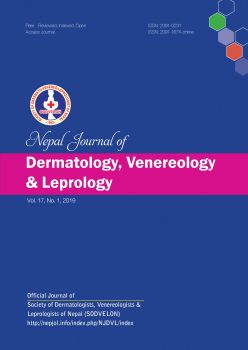Sporadic Progressive Symmetric Erythrokeratoderma: Classical Presentation of a rare Condition
DOI:
https://doi.org/10.3126/njdvl.v17i1.23293Keywords:
Genetic Heterogeneity, Keratoderma, palmoplantar, Nepal, RetinoidsAbstract
Progressive symmetrical erythrokeratodermia (PSEK) is a rare autosomal dominant genodermatosis presenting in infancy or early childhood. An 11-year-old male presented with a history of pruritic, erythematous, scaly, hyperkeratotic plaques first noted at 5 years of age, with no history of similar lesions in the family. Cutaneous examination revealed multiple, irregularly shaped, erythematous plaques with fine, shiny white, adherent scaling distributed symmetrically over the face, trunk, inguinal area, bilateral axillae and extensor surfaces of limbs. Palmoplantar keratoderma was present with thickened, yellowish discolored nails. No systemic abnormality was found. The histopathological findings were consistent with PSEK. The case is being reported to increase the awareness about this rare disease.
Downloads
Downloads
Published
How to Cite
Issue
Section
License
Copyright on any research article is transferred in full to Nepal Journal of Dermatology, Venereology & Leprology upon publication. The copyright transfer includes the right to reproduce and distribute the article in any form of reproduction (printing, electronic media or any other form).




